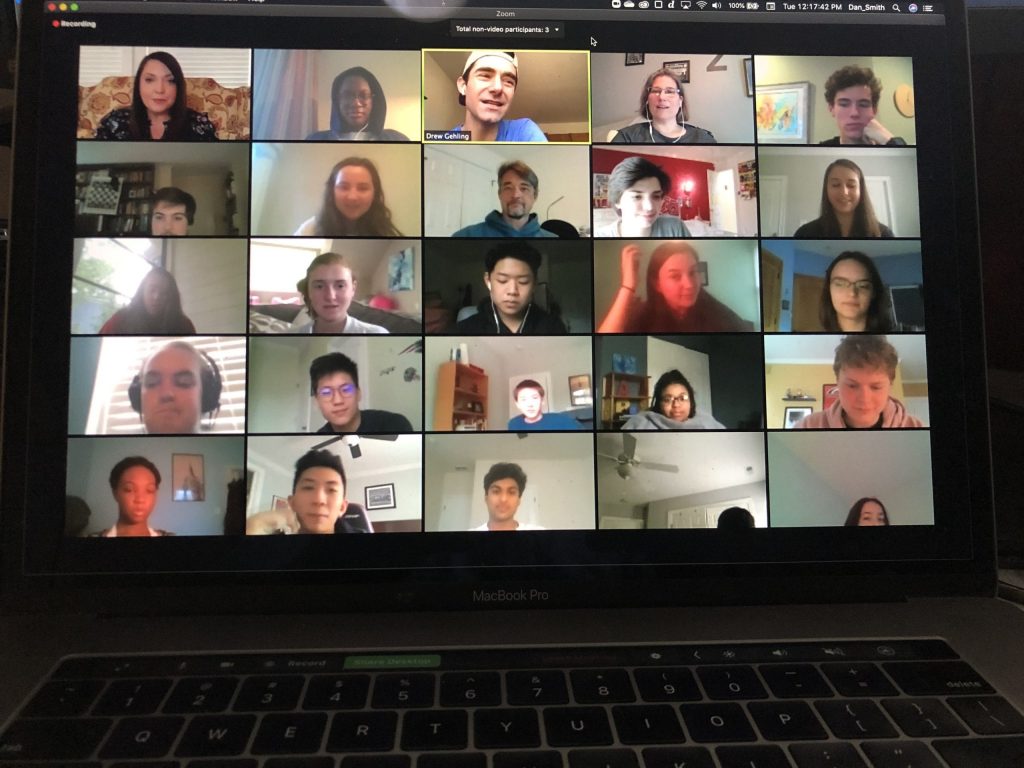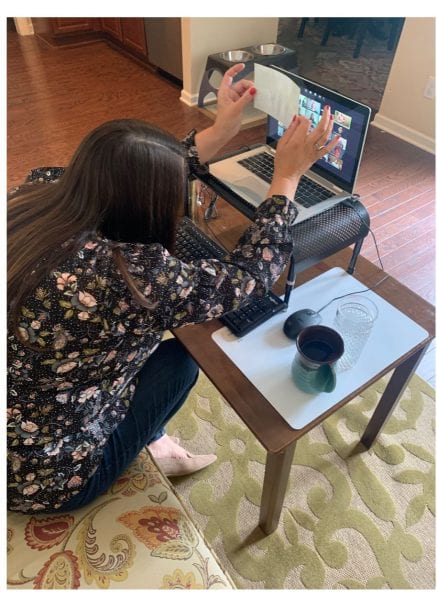What does virtual learning look like at Cary Academy? How do you create an environment focused on an innovative, student-centered, holistic approach to learning, when students and faculty are not in the same room (or even the same zip code)? How do we remain true to our mission pillars—discovery, innovation, collaboration, and excellence—and offer opportunities to keep learning flexible, personal, relevant, and connected during a period of stress, caution, and social distancing? As we head into the final weeks of Trimester 3 and our second month of distance learning, faculty from the Middle School and Upper School share stories of how they and their students have adapted to (and taken advantage of) the virtual learning environment.
Emily Turner, vocal music teacher
What does Emily Turner, director of the Cary Academy Singers, do when virtual choir rehearsals on Zoom simply aren’t possible? She calls in a favor from an old high school friend who just happens to be a Broadway star. While trying to think of ways to keep her Upper School chorus students connected to each other and excited about singing, Emily decided to reach out to her high school friend, Drew Gehling, to ask if he would join a CA Singers Zoom call to talk about his career and offer some inspiration to the students during this virtual learning time.
When she received his response, “Utterly happy to!”, she began emailing the students with one picture clue per day to reveal their mystery Zoom guest. During the call, Drew began by sharing the impact his high school choral music experience has had on his Broadway career, sharing behind-the-scenes stories highlighting the journey to some of his iconic Broadway roles in Jersey Boys and Waitress, as well as his most recent role in the new musical, Almost Famous, from the film of the same name.
The Cary Academy Singers had an opportunity to ask questions and even got to step back in time as Mrs. Turner waxed nostalgic, sharing photos of the two from senior prom and spring break. We are so grateful that Drew could take the time to be with our students and share his positivity and encouraging spirit!
Dr. Paige Meszaros, Upper School social science teacher
As many of us turn to streaming video to pass the time while staying safe at home, documentaries like Tiger King have sparked many questions amongst CA students about the ethics of the exotic animal industry and conservation of endangered species.
During advisory on Monday, May 11, the Class of 2022 took a virtual field trip to the Carolina Tiger Rescue located in Pittsboro, NC. Students met with Katie Cannon, Director of Education, for the tour and a Q & A. Ms. Cannon talked with the students about the history of the site, the care of the animals, and the differences between animal conservation and rescue centers, like the CTR, and other institutions such as amateur zoos and the exotic pet industry.

In particular, the presentation set the context for the recent success of Tiger King and the negative consequences of big cat breeding to produce white tigers. Students and advisors had the opportunity to ask questions about how current disruptions to the meatpacking industry impact the care of the animals.
Sarah Zhao ’22 said, “The tiger field trip was so cool! Seriously…I was taking pictures of the tigers on my phone!” Advisor and Upper School Math teacher John Noland thought, “[it gave] the students (and the advisors) a different look for advisory.”
Connecting the virtual field trip to the 10th grade advisory curriculum focus on community and service, students were able to see an important part of North Carolina’s commitment to good animal stewardship. Many participants have never been to the CTR; the opportunity arose through the efforts of 10th-grade advisor and math teacher, Caydee Revelle. The extended advisory time of 45 minutes and the virtual environment allowed the 10th grade an experiential learning opportunity that would be impossible on campus.
Jasmine Powell, dance teacher
How do the performing arts and physical education – both of which rely on movement in space translate to virtual learning? That’s exactly the conundrum that faced dance teacher Jasmine Powell in her Movement for Athletes class. Like her colleagues, she had to pivot the content and application of material to a virtual learning platform, giving her the opportunity to try something new: Parkour.
For Powell, Parkour is less about jumping from building to building, and more about laying the foundations of learning movement technique. Even when confined to basic vaults out of safety concerns, Parkour has much to offer athletes by challenging their risk-taking skills in the process of obtaining growth.
After working to ensure students took safety precautions and used proper technique (teaching proper alignment while landing in a low squat, showing how to fall properly to facilitate a smooth rebound to get back in the game as quickly as possible, etc.), Powell’s students designed parkour courses via hand-drawn plans or in Minecraft virtual environments, before putting them to the test in the real world.
Follow-up took place in group discussions about the process and shared lessons about fitness and hand-eye coordination. Students really enjoyed being assigned the task of going outside and being physically fit, while practicing parkour. It’s not every day that a graduating senior can say they learned parkour in high school!
Katie Taylor, Middle School language arts department leader
“Shabazz Week” with local poet Phillip Shabazz has been a fixture of the 6th grade curriculum since the late 1990s. Since students and Shabazz couldn’t be together, the 6th grade team found creative ways to transition in-person experiences to a virtual world, having Shabazz connect with students via Zoom.
There was a snag, though: Shabazz had never used Zoom before and didn’t have a computer with the necessary hardware. Cary Academy’s IS department (in particular Kevin Rokuskie) was able to loan Shabazz a tablet and meet with him to help him become a whiz with the Zoom software.
Though the faculty team would have preferred an in-person workshop, the students had a great experience. One student remarked, “My poem writing I think has gotten a lot better and quicker; this is because now I know the steps to writing a poem and even got professional suggestions. Now I know how to write a clean and smooth poem!”
In addition, the 6th grade team was excited to add a mindful movement workshop to this year’s curriculum, through a PTAA grant, to welcome Wake Forest’s “Flow Circus” to campus on March 26. When CA made the transition to virtual, cancelation looked inevitable.
Wanting to support our local partners and knowing how much students would love it, the team worked with Flow Circus to create a video series specific to Cary Academy that students can watch as their schedules allow. These videos are packed with lots of little inside jokes and specific curriculum geared towards our students’ needs.
Students have enjoyed watching the videos and learning how to juggle: “I really like how we are doing something fun aside of classes.”
Meredith Stewart, Middle School social studies department leader and David Snively, MS social studies teacher
Exploration of history took on a very contemporary twist as the 8th grade Watergate trial simulation took place on Zoom this year, in the same way actual U.S. courts have moved online.
Taking place in an alternate version of history, where Nixon decides not to resign after being impeached by the House of Representatives, in the simulation, 8th graders act as attorneys arguing before Senators (played by Upper School students) as to whether Nixon should be removed from office. Other 8th graders serve as witnesses called to testify about their interactions with Nixon and other players in the Watergate scandal.
Hewing true to the alternate history scenario, two different simulation sessions produced different results: Nixon was exonerated in one trial and removed from office in the other.
Shawn Nix, debate teacher
When the COVID-19 crisis hit, the Speech and Debate team was in the process of prepping for the most competitive part of the year: district qualifier to the annual National Speech and Debate Association Championship in June, the Tournament of Champions, NCFL championships and our North Carolina State Championships.
While the NCFL and State Championships were cancelled, the other major competitions went forward, virtually. That meant CA Speech and Debate had to figure out how to use a new platform to create reasonably professional videos of our speech competitors, learn how to share evidence between partners — across town from each other — during live debates in Public Forum and how to capture attention to speak in large Zoom congressional sessions.
Aside from a few starts and stops — from “please put a cushion on your chair so the judge sees more than your forehead”, to well, some expressions of “frustration” on the 10th attempt to perfect a speech, with limited space to move and a verbal slip-up on minute 9 – CA Speech and Debate students rose to the occasion!
Shawn Nix found the number of hours her students gave to perfecting their performance, getting their tape just right and figuring out how to debate on-line inspiring. Despite the difficulties, the team has many qualifiers for the big dance in June, including Will Aarons ’20 in Lincoln Douglas, Saajan Patel ’20 and Jay Sagrolikar ’21 in Congress (Congress qualifying in February), Vicky Jin ’21 and Anisha Rustogi ’21 in Extemp, Bayla Sheshadri ’21 in OO, Sydney Tai ’22 in POI, Arielle Curtis ’21 in Dramatic Interpretation, Alex Lim ’20 in Humorous Interpretation with others making it to the final rounds.
Robin Follet, Head of Upper School; Kristi McGauley, Upper School English teacher; Jamie Roszel, U.S. English teacher; and Palmer Seeley, U.S. English teacher
The US English Department was eagerly anticipating a new elective for all juniors this Spring: Rhetoric and Citizenship. The course sets out to combine a classic study of the art of argumentation while empowering students to choose a contemporary social issue to research and explore through a core nonfiction text as well as peer-reviewed, scholarly articles. Students then form panels based on shared areas of interest, develop a guiding panel question, and compose a speech in answer to the question.
By far, the highlight of the course is the Social Issues in America Conference, which follows more than a month of independent research and lessons on — and practice with — identifying and strategically implementing rhetorical appeals, strategies, and devices. The conference consists of a series of panel presentations where groups present their answers to their peers with a follow-up Q&A session.
Panels address a wide range of questions from What is the biggest problem in medicine today, and how should we solve it?to Does a democratic government have a fundamental obligation to be transparent to its constituents?to How can we design our society, through changes in our homes, schools, and workplaces, to help people reach their maximum creative potential?
Once teachers Robin Follet, Kristi McGauley, Jamie Roszel, and Palmer Seeley realized that the panel presentations would need to pivot to a virtual platform, they got to work adjusting expectations and establishing guidelines for meaningful conversations. Using Zoom, panelists have been able to present their speeches from a safe distance. Meanwhile, audience members use the chat feature to pose questions to specific speakers which then allows the panelists to expand on the depth and breadth of their knowledge. At the end of the Q&A, everyone gives a hand clap reaction for a job well done. Where normally CA community members are invited to drop in and participate in the audience, now they can view the presentations via the community Stream channel.



